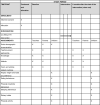Effect and process evaluation of a preschool-based intervention to promote an early childhood education and care teacher-parent partnership about healthy behaviours in children: Study protocol for the cluster randomised controlled trial CO-HEALTHY
- PMID: 36812263
- PMCID: PMC9946211
- DOI: 10.1371/journal.pone.0281999
Effect and process evaluation of a preschool-based intervention to promote an early childhood education and care teacher-parent partnership about healthy behaviours in children: Study protocol for the cluster randomised controlled trial CO-HEALTHY
Abstract
Background: Early Childhood Education and Care (ECEC) teachers at urban preschools are potential key figures to promote healthy behaviours in disadvantaged young children and to engage parents in lifestyle-related topics. An ECEC teacher-parent partnership regarding healthy behaviours may support parents and stimulate their children's development. However, it is not an easy task to establish such a collaboration and ECEC teachers need tools to communicate with parents about lifestyle-related topics. This paper describes the study protocol of a preschool-based intervention (CO-HEALTHY) to promote an ECEC teacher-parent partnership regarding healthy eating, physical (in)activity and sleeping behaviours in young children.
Methods: A cluster randomised controlled trial will be performed at preschools in Amsterdam, the Netherlands. Preschools will be randomly allocated to an intervention or control group. The intervention consists of a toolkit with 10 parent-child activities and associated training for ECEC teachers. The activities were composed using the Intervention Mapping protocol. At intervention preschools, ECEC teachers will carry out the activities during standard contact moments. Parents will receive associated intervention materials and will be encouraged to perform similar parent-child activities at home. At control preschools, the toolkit and training will not be implemented. The primary outcome will be the teacher- and parent-reported partnership regarding healthy eating, physical (in)activity and sleeping behaviours in young children. The perceived partnership will be assessed by a questionnaire at baseline and at 6 months. In addition, short interviews with ECEC teachers will be held. Secondary outcomes include the knowledge, attitude, food- and activity-related practices of ECEC teachers and parents. Furthermore, children's eating, physical (in)activity and sleeping behaviours, and weight development will be assessed. A process evaluation of the intervention will be made.
Discussion: The intervention aims to provide a practical tool for ECEC teachers at urban preschools to promote an ECEC teacher-parent partnership regarding a healthy lifestyle in young children.
Trial registration: Netherlands Trial Register (NTR): NL8883. Date registered: September 8, 2020.
Copyright: © 2023 Toussaint et al. This is an open access article distributed under the terms of the Creative Commons Attribution License, which permits unrestricted use, distribution, and reproduction in any medium, provided the original author and source are credited.
Conflict of interest statement
The authors have declared that no competing interests exist.
Figures
Similar articles
-
A preschool-based intervention for Early Childhood Education and Care (ECEC) teachers in promoting healthy eating and physical activity in toddlers: study protocol of the cluster randomized controlled trial PreSchool@HealthyWeight.BMC Public Health. 2019 Mar 7;19(1):278. doi: 10.1186/s12889-019-6611-x. BMC Public Health. 2019. PMID: 30845936 Free PMC article.
-
The effects of a preschool-based intervention for Early Childhood Education and Care teachers in promoting healthy eating and physical activity in young children: A cluster randomised controlled trial.PLoS One. 2021 Jul 23;16(7):e0255023. doi: 10.1371/journal.pone.0255023. eCollection 2021. PLoS One. 2021. PMID: 34298547 Free PMC article. Clinical Trial.
-
Building the skills and confidence of early childhood educators to work with parents: study protocol for the Partnering with Parents cluster randomised controlled trial.BMC Med Res Methodol. 2019 Oct 24;19(1):197. doi: 10.1186/s12874-019-0846-1. BMC Med Res Methodol. 2019. PMID: 31651251 Free PMC article. Clinical Trial.
-
Which Meso-Level Characteristics of Early Childhood Education and Care Centers Are Associated with Health, Health Behavior, and Well-Being of Young Children? Findings of a Scoping Review.Int J Environ Res Public Health. 2021 May 7;18(9):4973. doi: 10.3390/ijerph18094973. Int J Environ Res Public Health. 2021. PMID: 34067043 Free PMC article.
-
Characteristics of Effective Interventions Promoting Healthy Eating for Pre-Schoolers in Childcare Settings: An Umbrella Review.Nutrients. 2018 Mar 1;10(3):293. doi: 10.3390/nu10030293. Nutrients. 2018. PMID: 29494537 Free PMC article.
Cited by
-
Interventions to prevent obesity in children aged 2 to 4 years old.Cochrane Database Syst Rev. 2025 Jun 11;6(6):CD015326. doi: 10.1002/14651858.CD015326.pub2. Cochrane Database Syst Rev. 2025. PMID: 40494564 Free PMC article.
References
-
- World Health Organisation. Obesity and overweight. Available from: https://www.who.int/news-room/fact-sheets/detail/obesity-and-overweight.
Publication types
MeSH terms
LinkOut - more resources
Full Text Sources


